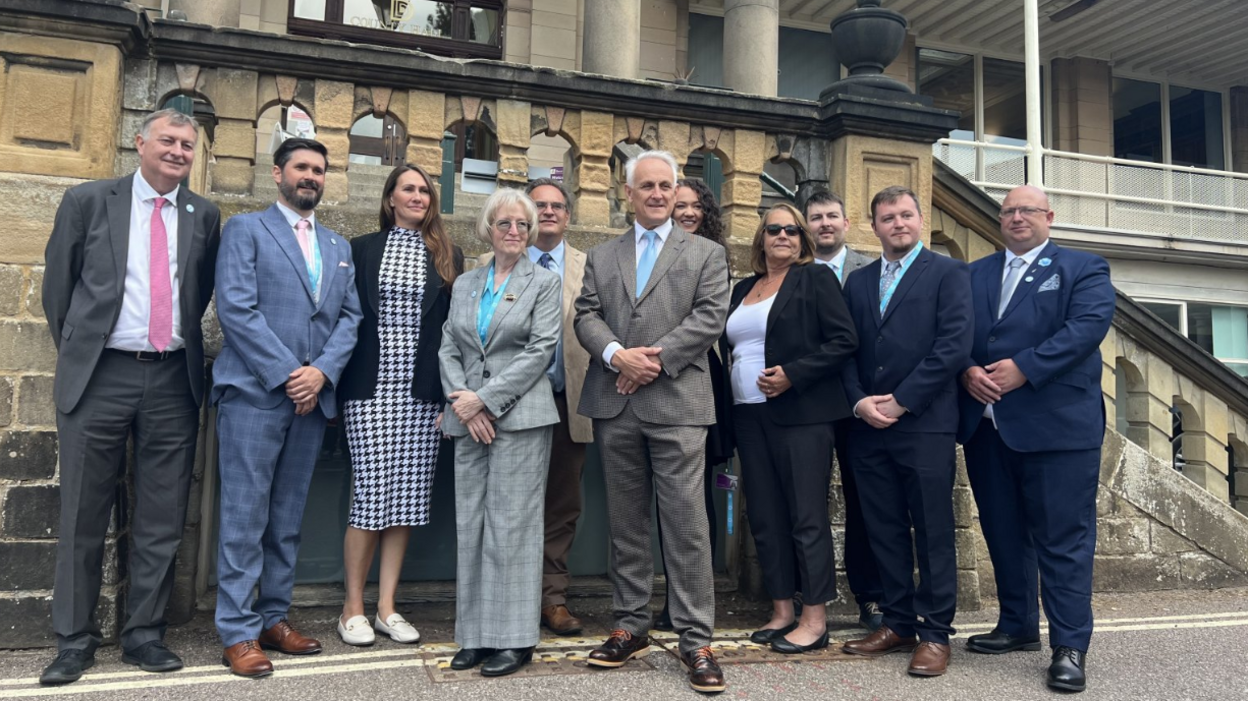How are region's Reform councils doing six months in?

Reform UK is the largest party on Leicestershire County Council but does not have a majority - while it also runs Derbyshire and Nottinghamshire county councils
- Published
Six months ago a turquoise tide swept across the East Midlands, as Reform UK made its mark at the ballot box.
In Nottinghamshire and Derbyshire, Nigel Farage's party gained control of the county councils - pushing the Conservatives out of power.
And in Leicestershire, Reform fell short of a majority, but as the largest single party was able to form a minority administration.
The message from voters seemed clear - change was wanted. But after an eventful first few months, what have Reform's new council bosses delivered?
I spoke to people in Ilkeston in Derbyshire, and the response was mixed.
"I haven't been aware of any significant change since they came in to be honest," said one person.
"I think it's going great, yeah," added a satisfied voter.
A third said: "There's a lot of all talk, and no action. I'm not overly impressed at the moment."
This was just a snapshot of views in the town, six months after Reform UK formally took over the running of Derbyshire County Council.
It is far from an exact science gathering opinions on a high street in the middle of the day.
Even in a place that voted overwhelmingly for Reform in May, though, it seems the jury is still out.
Ilkeston is in the Erewash parliamentary constituency, which turned from Conservative to Labour at the general election last year.
But in May, Reform secured 56% of the vote in Ilkeston, as the party replaced the Conservatives at the helm of every county council in the East Midlands.

Derbyshire's first Reform UK cabinet has already had a reshuffle after a resignation
Although it is still early days for each Reform UK council, there has still been time for a controversial decision on flags, a high-profile Reform ban on a local newspaper and the removal of senior council members from cabinet roles.
Dozens of councillors were elected for the first time, and many were brand new to politics, so teething problems were always likely.
But Reform says it has made progress in some of the key areas county councils are responsible for, including adult social care, special educational needs provision and road maintenance.
Supporters of other parties often argue that when voters see how Reform runs their local authority, they will think twice before backing them in a general election.

Reform claims it has mended a backlog of potholes on Derbyshire's roads
A lot of the people I spoke to in Ilkeston were paying little or no attention to goings-on at County Hall.
However when it came to potholes, a perennial problem in this part of the world, pretty much everyone had an opinion.
The Reform administration in Derbyshire claims to have almost cleared a backlog of pothole repairs it inherited from the Tories.
"I must admit they are a little better," says one man, who told me he would give Reform four out of 10 for its performance so far.
But another disgruntled motorist said the potholes "haven't changed one little bit. They're still there".
Social care is another tough nut for county councils to crack.
Sandra Kimbly, who worked in the sector in Derbyshire for 20 years, said: "Having visited quite a few homes, there's not much change as regards to staffing issues.
"With Reform, a lot people are just focusing on illegal immigration.
"Personally, I'm thinking I've not really looked into what other problems Reform are looking at."
In neighbouring Nottinghamshire, Reform says it has saved £400,000 by making changes to social care accommodation.
It is an example of the waste-cutting drive the party said it would carry out, but talk of Doge-style teams going into councils in the East Midlands is yet to materialise.
Leicestershire's minority administration has recently announced its own plans to pay consultants up to £1.4m to identify tens of millions of savings.
The budget-setting process for the next financial year is under way, and rather than cutting council tax, many Reform-led authorities are expected to ask residents to pay more.
'Wait and see'
Critics say that the first six months have been a reality check for those who made promises on the campaign trail they were unlikely to keep.
Furthermore, the Conservatives argue that much of what Reform claims it has achieved is thanks to the groundwork laid by previous administrations.
Meanwhile, Labour points to increases in central government funding for councils, including a record investment in pothole repairs.
The argument over who can claim the most credit for any improvements in services will go on, and judging by what I heard in Ilkeston, voters will be difficult to impress.
"Political parties are supposed to be for the people and as far as I'm concerned they don't listen enough to the people," one woman tells me.
"I think we need to be heard more, and I'm hoping maybe Reform is going to come up with that in the future. But I'll wait and see."
Analysis
By Dan Martin, Leicester political reporter
It's been an unsettled start for Leicestershire County Council's new Reform UK minority administration.
The party has delivered some early crowd-pleasers for its voters, bringing in a new policy restricting what flags could be flown at County Hall to those it says represent "British values" – and moving £2m of funding earmarked for net-zero projects to flood prevention measures.
But opposition councillors accused them of dragging their feet on setting out their position on looming local government reorganisation - and Reform has already had to replace two cabinet members appointed only in May.
And big challenges are around the corner for Reform - particularly in setting its first budget.
Before May's election, its candidates campaigned to say they would cut council tax, but aspiration appears to have collided with reality and now a major review of council spending is about to begin with leader Dan Harrison saying he hopes to limit an increase in the precept to 3% from April.
With only 25 councillors, Reform cannot command a majority in the council chamber, and other parties have warned they may not support a budget involving heavy cuts to council services.
By Anna Whittaker, Nottingham political reporter
When 40 Reform councillors won seats on Nottinghamshire County Council in May, few would've predicted they'd make international headlines within six months.
But that's exactly what happened in August when council leader Mick Barton banned the Nottingham Post from interviews, events, and press releases in a disagreement over a story about local government reform. It was a move that drew widespread attention and was discussed in US Congress.
Local government reform has been top of the agenda - and councillors confirmed their preference in September, which would see Gedling and Broxtowe joined with Nottingham,
The administration points to progress in the county's special educational needs and disabilities (SEND) system, with the proportion of education, health and care (EHC) plans completed within 20 weeks rising from 37% to 47% - now above the UK average.
The council also says it has made £400,000 of savings in adult social care accommodation costs - which was disputed by opposition leader Sam Smith, who argues the savings were initiated under the Conservative administration.
One of the most talked about spending decisions has been the £75,000 for new county-wide flags, with more than 150 union jacks first to be lifted.
Barton defended the move as a way to "strengthen community spirit" - but it's a decision that has divided opinion.
With budget setting on the horizon, some of Reform's biggest tests are still yet to come.
By Colin Hazelden, Derby political reporter
Reform UK dominate Derbyshire County Council and arrived with the benefit of an experienced local politician as leader - Alan Graves has been a Derby city councillor for nearly 30 years, but they haven't had a completely smooth ride.
The new administration attracted the ire of environmentalists when they scrapped the council's climate change committee soon after taking power - and Graves himself caused controversy when he said special educational needs were "over-diagnosed".
Most recently, they've acknowledged council tax will have to rise by the maximum amount possible from April.
But they are trumpeting savings - claiming to have found £53m of efficiencies in their first six months - and are proud of their work on potholes.
While the leader may have plenty of experience, most of his 41 fellow Reform UK councillors were brand-new to local government.
Some have found the transition harder than others.
Two have resigned on health grounds, one of them a cabinet member. Two others had to be removed from committees because their day jobs stopped them being able to attend.
But cabinet members also tell me there's a positive side to their inexperience - they say they're improving the way things work by getting involved in decision-making in a way more long-serving councillors might not.
Get in touch
Tell us which stories we should cover in Leicester
Follow BBC Leicester on Facebook, external, on X, external, or on Instagram, external. Send your story ideas to eastmidsnews@bbc.co.uk, external or via WhatsApp, external on 0808 100 2210.